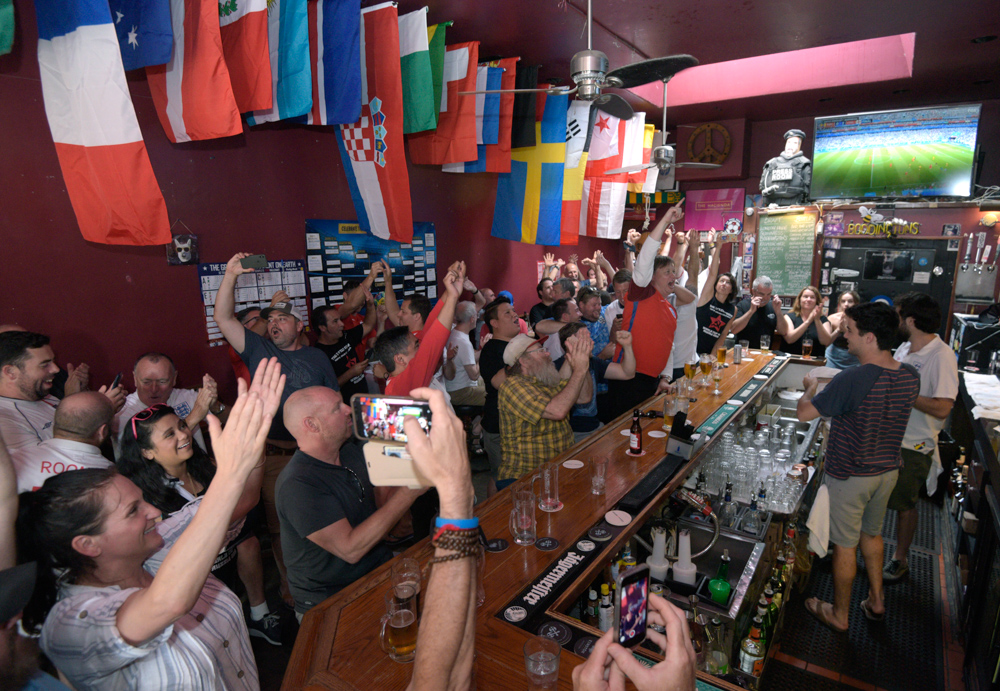Santa Barbara’s World Cup Referee
Frank Anderson Rises from Midland School and Dwight Murphy Field to Calling Soccer’s Top Matches

Twenty-four years after playing soccer at tiny Midland School in the Santa Ynez Valley, Frank Anderson made it to the World Cup. He is one of four American professional referees who did what the U.S. men’s team could not do. They qualified to perform on the field in the world’s most-watched sporting event.
Anderson earned three assignments to serve as assistant referee: The group-stage matches between Portugal and Morocco and Germany and South Korea, and the round-of-16 match between England and Colombia. As a sideline referee, his responsibilities included judging the possession of balls that leave the field of play and enforcing the offside rule. Mark Geiger, another American, was the head referee in all three games, having worked the 2014 World Cup.
Anderson and Geiger were in the spotlight during the frantic final minutes of their second game, when South Korea scored twice to oust Germany, the reigning World Cup champion. On the first goal by Kim Young-gwon, Anderson raised the flag to rule offside, which would have nullified the score. The play automatically was reviewed by the newly installed VAR (video assistant referees) system. Their assessment did not dispute Anderson’s view that Kim was in an offside position, but they saw that a German defender had deflected the ball to the Korean; therefore the goal counted.
Watching with acute interest in his Santa Barbara home was Frank’s twin brother, Ian Anderson, also a professional referee. “I know what’s going on in his head,” Ian said. “I could see the pressure in his face when he called offside. He did not have an angle to see where the ball came from. That proved the value of VAR.”
The Germans, who yielded another late goal into a net abandoned by the goalkeeper, had no complaints. Their defeat enabled a despairing Mexico to advance out of group play in one of the many dramatic episodes at this World Cup.
“The Korea–Germany game was wonderful and demonstrated that Americans can and should be involved as referees at the highest level,” Frank Anderson said in a text message from Moscow. “Just like the best teams are here in Russia, so are all the best referees in the world.”
Predictably, accusations of malfeasance came from the losing sides in other matches. A Moroccan player frivolously accused Geiger of asking Portugal star Cristiano Ronaldo for his shirt during the game. FIFA, the commanding agency of the World Cup, issued a statement that condemned the allegation as false.
Colombia complained that it received harsh treatment from the referees in its match against England, a 1-1 tie that was decided by penalty kicks. England’s goal came by penalty after Harry Kane was mauled by a defender. Geiger’s call was vehemently disputed by the Colombians, who also received the dubious support of former Argentine star Diego Maradona, not known as an exemplar of honesty in World Cup matters.

As far as the Brits are concerned, Geiger, Anderson, and crew deserve plaudits for helping the match reach a fair conclusion. England’s most formidable opponent was its own tortured past, a series of abject failures in penalty-kick shootouts. Millions of its fans around the world were seemingly more worried than the four players who stood up and rifled the ball past the Colombian goalie. “I’m still hyperventilating,” said British patriot James Rafferty, proprietor of Santa Barbara’s Press Room bar, 30 minutes after England’s stirring victory.
A surprisingly easy 2-0 victory over Sweden in the quarterfinal round put England in this week’s semifinal against Croatia. Could the title be coming home, as in the yearning lyric of England’s theme song “Three Lions”? France or Belgium, the contenders in the other semifinal, would be an imposing last hurdle. The final showdown in Moscow will take place at 8 a.m. (Santa Barbara time) Sunday.
The referees and assistant referees assigned to the World Cup — numbering 99 in all — were sequestered in a Moscow hotel. They receive VIP tickets to games in the city. “The opening game between Russia and Saudi Arabia was special,” Frank Anderson said. “During the national anthems, I was getting goosebumps. I was living out my dream of attending a World Cup as a referee.”
He began the journey along with his brother during their freshman year at UCSB, when they started refereeing high school games. In 1996, they became certified for adult amateur games. That put them in the middle of hotly contested affairs at Dwight Murphy Field. “Those games helped me become the referee I am today,” he said. “They toughened me up because of the intensity of the games. You had to be prepared for anything to happen. I had to become an effective communicator and manager of players because I was dealing with adults who were years older than I was.”
Ian Anderson said, “We would joke that the players treated it as a World Cup, and now Frank is really in the World Cup.”
The Andersons entered the professional ranks as MLS (Major League Soccer) referees in 2005, and eventually they became internationally certified as FIFA assistant referees. They worked in several tournaments administered by CONCACAF (the North America, Central America, and Caribbean federation). Frank refereed at the Under-17 FIFA World Cup in India last year and was selected for the Peru-at-New Zealand playoff that qualified Peru for the World Cup in November.
Both Andersons were invited in March to a weeklong FIFA seminar for prospective World Cup referees in Dubai. In the end, Frank was the chosen one.
“I’ve been fortunate to have shared this long journey with [Ian],” he said. “He and I talk daily, and I would not be where I am without him.”
Soon Frank will return to his home in Ojai, and the brothers will get together again. At the World Cup, he was like an avatar. Said Ian: “I was right there with him.”



